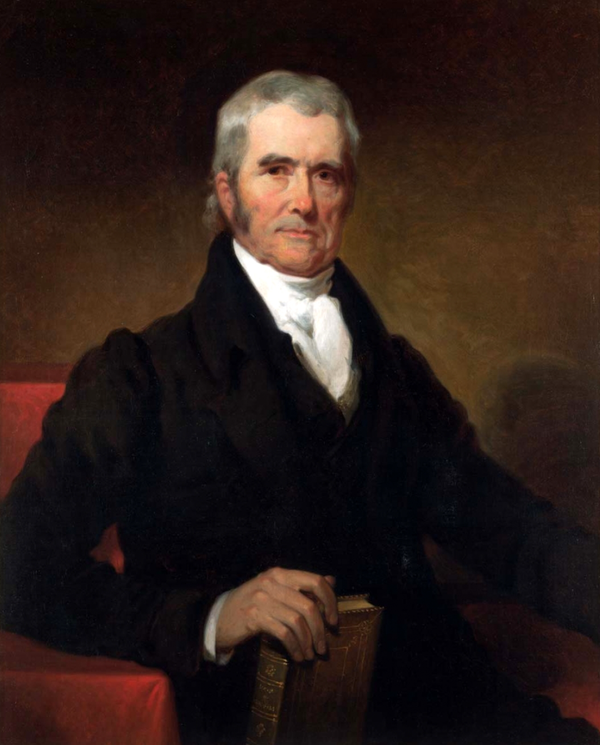John Roberts Counsels Despair
The Supreme Court, in a per curiam opinion that seems like it was probably written by Chief Justice John Roberts, just vacated District Judge Boasberg's order preventing the Trump Administration from "deporting" Venezuelan nationals to a slave camp in El Salvador under the Alien Enemies Act of 1798. The majority opinion conceives of the case as quite technical. They agree, with the detainees and with the dissenters and with all the liberals who are so mad at them, that the Due Process Clause requires these detainees to be given a hearing before they're removed from the country! All they're saying is that the vehicle for judicial review in these cases simply must be a habeas corpus petition brought in the district of confinement, in this case the Southern District of Texas. What's the big deal?
Sonia Sotomayor's dissenting opinion explains quite thoroughly what the big deal is. Go read it if you want a clear and succinct explanation of the many technical flaws in Roberts's legal reasoning. At the same time, she does take pains to emphasize the point of agreement with the majority. This line in particular has been making the rounds, as people try to figure out Exactly How Bad This Ruling Is:
To the extent the Government removes even one individual without affording him notice and a meaningful opportunity to file and pursue habeas relief, it does so in direct contravention of an edict by the United States Supreme Court.
I get why Sotomayor would try to hammer home this point. But I am reminded of another passage by a great jurist, one Oliver Wendell Holmes:
If you want to know the law and nothing else, you must look at it as a bad man, who cares only for the material consequences which such knowledge enables him to predict, not as a good one, who finds his reasons for conduct, whether inside the law or outside of it, in the vaguer sanctions of conscience.
If we were dealing with good men, who cared about conformity to law for its own sake, then John Roberts's stern reminders about the need for due process would matter greatly. But we are not; everyone knows we are not. Sotomayor certainly knows it; this is why her dissent spends much of its length going over the history of the government's shady conduct in this very case. No one can possibly have the faintest illusion that the Trump Administration would decline to render these detainees to El Salvador simply because that would be illegal. The question, then, can only be what will the courts do about it if they do?
The passage I just quoted from Holmes marks the beginning, it is often thought, of the legal realist movement. These early realists were rebelling against a culture of legal formalism, one that saw legal questions in supremely abstract terms, divorced from such things as "the real-world stakes" or "what's really going on." Nowhere could that formalist ethos be seen more starkly than in Plessy v. Ferguson (1896), one entire year before Holmes wrote, wherein the Court accepted the preposterous notion that Jim Crow segregation did not offend the Equal Protection Clause because, you see, whites as well as blacks were prohibited from consorting with the other race.
Sixty-three years after Holmes's piece, writing in defense of the decision that overturned Plessy, my grandfather Charles Black had this to say:
The case seems so onesided that it is hard to make out what is being protested against when it is asked, rhetorically, how the Court can possibly advise itself of the real character of the segregation system. It seems that what is being said is that, while no actual doubt exists as to what segregation is for and what kind of societal pattern it supports and implements, there is no ritually sanctioned way in which the Court, as a Court, can permissibly learn what is obvious to everyone else and to the Justices as individuals. But surely, confronted with such a problem, legal acumen has only one proper task—that of developing ways to make it permissible for the Court to use what it knows; any other counsel is of despair.
Any other counsel is of despair. Yes, precisely. That sums up the jurisprudence and legacy of John G. Roberts perfectly. His entire life has been dedicated to this, from his days as a young lawyer in Reagan's Justice Department crusading against the Voting Rights Act straight through to yesterday's decision. Here is another passage from my grandfather, in his article about the so-called "state action" doctrine:
As I have remarked, the Court now fully recognizes the vagueness and plasticity of the "state action" doctrine. ... This state of doctrine will always seem deplorable to some lawyers. But it is a state of doctrine imposed and not chosen. The "state action" concept in the field to which I have limited myself has just one practical function; if and where it works, it immunizes racist practices from constitutional control. Those who desire to practice racism are therefore motivated, even driven, to test it through total possibility; the metaphor of Proteus is exact. And its potential variety is simply the variety of all possible action by that complex entity that is called the state. The commitment of the Court to a single and exclusive theory of state action, or to just five such theories, with nicely marked limits for each, would be altogether unprincipled, in terms of the most vital principle of all - the reality principle. It would fail to correspond to the endless variations not only of reality as presently given, but of reality as it may be manipulated and formed in the hands of people ruled by what seems to be one of the most tenacious motives in American life. Such an arbitrary commitment would serve only to instruct racism in the essentials of evasory tactics; it would make the law, classically, "Their perch and not their terror."
I don't know if John Roberts has ever read this passage. But I can imagine that he did, and thought to himself, "you say that like it's a bad thing." His entire project has been that of imposing strict limits on the remedial power of the courts. That this has the effect of permitting the "bad men" of American public life to make the law their perch and not their terror, that it provides safe harbor for them to flout core constitutional commitments without fear of redress, is so predictable that I cannot believe Roberts does not know what he's doing.
The genius is, though, that he never has to come out and say it! He never has to say that Brown v. Board was wrongly decided: he just has to make it impossible, in practical terms, to desegregate the schools. He doesn't have to say that January 6th wasn't an insurrection, just that nobody could impose consequences for it because uhhhh federal supremacy, yeah, that's the one. And he doesn't have to say that kidnapping people off the streets and smuggling them off to slavery in El Salvador is legal. All he has to do is stop the people who are trying to stop it from happening, because I guess they used the wrong procedural vehicle. How genteel of him.
I should say, in fairness, that the question of exactly how bad this decision is remains somewhat up in the air. The fate of Kilmar Abrego Garcia, whom a federal judge in Maryland ordered the government to retrieve from El Salvador, is still pending before the Court. In what I have to consider the unlikely event that they end up affirming the judge's order, and that Abrego Garcia is actually returned to America, then we would have an answer to the question "yeah but what if the government just does the illegal thing anyway?" Not a perfect answer, mind you: for these people to spend even one day in the Salvadoran hellhole is one day too many. Ideally there would be ruinous consequences for those who make such "mistakes." But it would be something.
I'm not holding my breath, though. Because the Trump Administration's position – yes, we concede that Abrego Garcia should not have been sent to El Salvador, but alas there's simply nothing we can do about it now – is just so very John Roberts.


